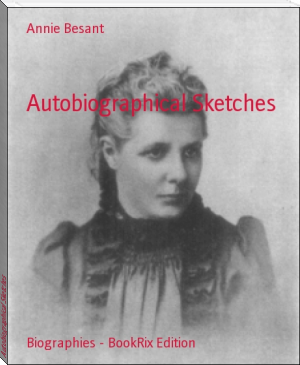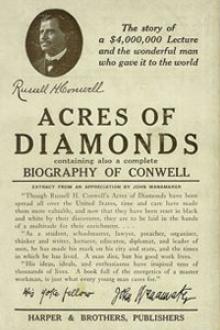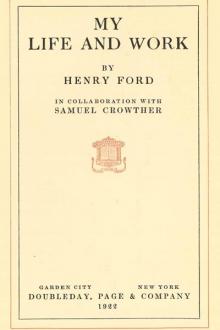Annie Besant - Annie Besant (free e reader .txt) 📗

- Author: Annie Besant
Book online «Annie Besant - Annie Besant (free e reader .txt) 📗». Author Annie Besant
For as a child I was mystical and imaginative religious to the very finger-tips, and with a certain faculty for seeing visions and dreaming dreams. This faculty is not uncommon with the Keltic races, and makes them seem "superstitious" to more solidly-built peoples. Thus, on the day of my father's funeral, my mother sat with vacant eyes and fixed pallid face--the picture comes back to me yet, it so impressed my childish imagination--following the funeral service, stage after stage, and suddenly, with the words, "It is all over!" fell back fainting. She said afterwards that she had followed the hearse, had attended the service, had walked behind the coffin to the grave. Certain it is that a few weeks later she determined to go to the Kensal Green Cemetery, where the body of her husband had been laid, and went thither with a relative; he failed to find the grave, and while another of the party went in search of an official to identify the spot, my mother said, "If you will take me to the chapel where the first part of the service was read, I will find the grave." The idea seemed to her friend, of course, to be absurd; but he would not cross the newly-made widow, so took her to the chapel. She looked round, left the chapel door, and followed the path along which the corpse had been borne till she reached the grave, where she was quietly standing when the caretaker arrived to point it out. The grave is at some distance from the chapel, and is not on one of the main roads; it had nothing on it to mark it, save the wooden peg with the number, and this would be no help to identification at a distance since all the graves are thus marked, and at a little way off these pegs are not visible. How she found the grave remained a mystery in the family, as no one believed her straightforward story that she had been present at the funeral. With my present knowledge the matter is simple enough, for I now know that the consciousness can leave the body, take part in events going on at a distance, and, returning, impress on the physical brain what it has experienced. The very fact that she asked to be taken to the chapel is significant, showing that she was picking up a memory of a previous going from that spot to the grave; she could only find the grave if she started from _the place from which she had started before_. Another proof of this ultra-physical capacity was given a few months later, when her infant son, who had been pining himself ill for "papa," was lying one night in her arms. On the next morning she said to her sister: "Alf is going to die." The child had no definite disease, but was wasting away, and it was argued to her that the returning spring would restore the health lost during the winter. "No," was her answer. "He was lying asleep in my arms last night, and William" (her husband) "came to me and said that he wanted Alf with him, but that I might keep the other two." In vain she was assured that she had been dreaming, that it was quite natural that she should dream about her husband, and that her anxiety for the child had given the dream its shape. Nothing would persuade her that she had not seen her husband, or that the information he had given her was not true. So it was no matter of surprise to her when in the following March her arms were empty, and a waxen form lay lifeless in the baby's cot.
My brother and I were allowed to see him just before he was placed in his coffin; I can see him still, so white and beautiful, with a black spot in the middle of the fair, waxen forehead, and I remember the deadly cold which startled me when I was told to kiss my little brother. It was the first time that I had touched Death. That black spot made a curious impression on me, and long afterwards, asking what had caused it, I was told that at the moment after his death my mother had passionately kissed the baby brow. Pathetic thought, that the mother's kiss of farewell should have been marked by the first sign of corruption on the child's face!
I do not mention these stories because they are in any fashion remarkable or out of the way, but only to show that the sensitiveness to impressions other than physical ones, that was a marked feature in my own childhood, was present also in the family to which I belonged. For the physical nature is inherited from parents, and sensitiveness to psychic impressions is a property of the physical body; in our family, as in so many Irish ones, belief in "ghosts" of all descriptions was general, and my mother has told me of the banshee that she had heard wailing when the death-hour of one of the family was near. To me in my childhood, elves and fairies of all sorts were very real things, and my dolls were as really children as I was myself a child. Punch and Judy were living entities, and the tragedy in which they bore part cost me many an agony of tears; to this day I can remember running away when I heard the squawk of the coming Punch, and burying my head in the pillows that I might shut out the sound of the blows and the cry of the ill-used baby. All the objects about me were to me alive, the flowers that I kissed as much as the kitten I petted, and I used to have a splendid time "making believe" and living out all sorts of lovely stories among my treasured and so-called inanimate playthings. But there was a more serious side to this dreamful fancy when it joined hands with religion.
CHAPTER II.
EARLY CHILDHOOD.
And now began my mother's time of struggle and of anxiety. Hitherto, since her marriage, she had known no money troubles, for her husband was earning a good income; he was apparently vigorous and well: no thought of anxiety clouded their future. When he died, he believed that he left his wife and children safe, at least, from pecuniary distress. It was not so. I know nothing of the details, but the outcome of all was that nothing was left for the widow and children, save a trifle of ready money. The resolve to which my mother came was characteristic. Two of her husband's relatives, Western and Sir William Wood, offered to educate her son at a good city school, and to start him in commercial life, using their great city influence to push him forward. But the young lad's father and mother had talked of a different future for their eldest boy; he was to go to a public school, and then to the University, and was to enter one of the "learned professions"--to take orders, the mother wished; to go to the Bar, the father hoped. On his death-bed there was nothing more earnestly urged by my father than that Harry should receive the best possible education, and the widow was resolute to fulfil that last wish. In her eyes, a city school was not "the best possible education," and the Irish pride rebelled against the idea of her son not being "a University man." Many were the lectures poured out on the young widow's head about her "foolish pride," especially by the female members of the Wood family; and her persistence in her own way caused a considerable alienation between herself and them. But Western and William, though half-disapproving, remained her friends, and lent many a helping hand to her in her first difficult struggles. After much cogitation, she resolved that the boy should be educated at Harrow, where the fees are comparatively low to lads living in the town, and that he should go thence to Cambridge or to Oxford, as his tastes should direct. A bold scheme for a penniless widow, but carried out to the letter; for never dwelt in a delicate body a more resolute mind and will than that of my dear mother.
In a few months' time--during which we lived, poorly enough, in Richmond Terrace, Clapham, close to her father and mother--to Harrow, then, she betook herself, into lodgings over a grocer's shop, and set herself to look for a house. This grocer was a very pompous man, fond of long words, and patronised the young widow exceedingly, and one day my mother related with much amusement how he had told her that she was sure to get on if she worked hard. "Look at me!" he said, swelling visibly with importance; "I was once a poor boy, without a penny of my own, and now I am a comfortable man, and have my submarine villa to go to every evening." That "submarine villa" was an object of amusement when we passed it in our walks for many a long day.
"There is Mr. ----'s submarine villa," some one would say, laughing: and I, too, used to laugh merrily, because my elders did, though my understanding of the difference between suburban and submarine was on a par with that of the honest grocer.
My mother had fortunately found a boy, whose parents were glad to place him in her charge, of about the age of her own son, to educate with him; and by this means she was able to pay for a tutor, to prepare the two boys for school. The tutor had a cork leg, which was a source of serious trouble to me, for it stuck out straight behind when we knelt down to family prayers--conduct which struck me as irreverent and unbecoming, but which I always felt a desire to imitate. After about a year my mother found a house which she thought would suit her scheme, namely, to obtain permission from Dr. Vaughan, the then head-master of Harrow, to take some boys into her house, and so gain means of education for her own son. Dr. Vaughan, who must have been won by the gentle, strong, little woman, from that time forth became her earnest friend and helper; and to the counsel and active assistance both of himself and of his wife, was due much of the success that crowned her toil. He made only one condition in granting the permission she asked, and that was, that she should also have in her house one of the masters of the school, so that the boys should not suffer from the want of a house-tutor. This condition, of course, she readily accepted, and the arrangement lasted for ten years, until after her son had left school for Cambridge.
The house she took is now, I am sorry to say, pulled down, and replaced by a hideous red-brick structure. It was very old and rambling, rose-covered in front, ivy-covered behind; it stood on the top of Harrow Hill, between the church and the school, and had once been the vicarage of the parish, but the vicar had left it because it was so far removed from the part of the village where all his work lay. The drawing-room opened by an old-fashioned half-window, half-door--which proved a constant source of grief to me, for whenever I had on a new frock I always





Comments (0)